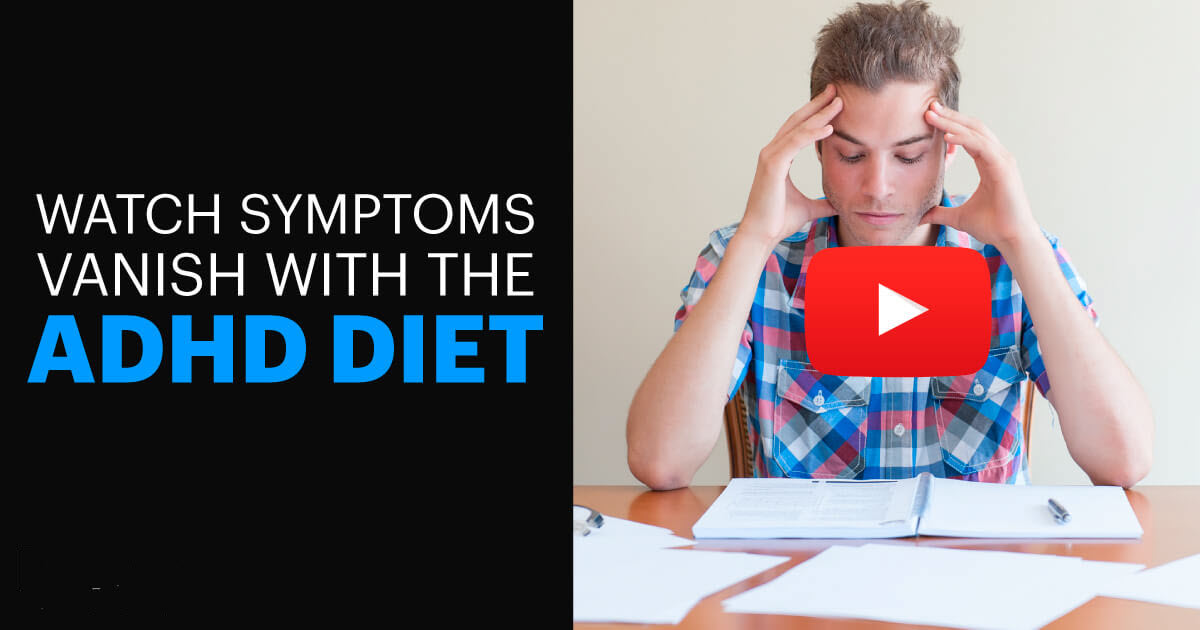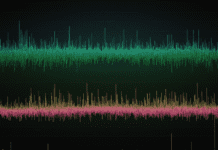
[Below is the transcript of my video on how to treat ADHD naturally with an ADHD diet, along with supplemental information on the topic.]
Today, I’m going to share with you the top foods, supplements, natural treatments, and essential oils in the treatment of ADHD.
And I guarantee that if you follow these tips with yourself or a child you’re working with, you’re going to notice significant improvements in focus and overall reducing those symptoms of ADHD.
I was diagnosed with attention deficit hyperactivity disorder (ADHD) as a child, and I can still remember today,
my mom going and getting me tested all the time because I had so much trouble focusing.
There are some things that I did later on in life that I found made a significant impact on my ability to focus, in particular, adopting an ADHD diet.
What Is ADHD?
I want to start by saying that ADHD is not a disease. ADHD is people, and whether it be a male or a female,
it’s the way your brain chemistry works — and some of it is personality traits.
I’ll talk about this a little later on, but most people with ADHD are male, especially male children.
Also, a lot of times, there are different types of learning for people with ADHD; people can be kinesthetic learners or auditory learners, so I’ll talk about that as well.
ADHD and attention deficit disorder (ADD) are neurological and behavior-related conditions that cause difficulty in concentrating, impulsiveness, and excessive energy.
Individuals with ADHD not only have a challenge in concentrating but have a problem sitting still. Those with ADHD are typically more disruptive than individuals with ADD.
ADHD often has an onset age of 7, but this disorder can continue through teen years and well into adulthood.
It’s estimated that ADHD affects 9 percent of American children between the ages of 13 and 18 and over 4 percent of adults.
According to the NIH’s National Institute of Mental Health, “the number of children being diagnosed with ADHD is increasing, but it is unclear why.”
Most physicians and research indicate the increase in ADHD is directly linked to the food we eat.
Foods to Avoid on the ADHD Diet
There is no doubt, whether it’s a personality trait or a nutritional deficiency, that these tips will help. So let’s start off talking about an ADHD diet.
Now, the No. 1 thing most of you know is you’ve got to remove sugar and specifically gluten from children or adults with ADHD.
Sugar is a significant problem because it will cause blood-sugar spikes, which then really causes focus levels to drop when the blood-sugar peaks down — which will create a lack of focus.
Then on a high spike, it will prompt that hyperactivity behavior. So kick your sugar addiction, and getting sugar out of the diet, mainly processed sugar, is No. 1.
Other foods to avoid include:
- Gluten
- Conventional dairy
- Food coloring and dyes
- Caffeine
- MSG and HVP
- Nitrates
- Artificial sweeteners
- Soy
- Personal food sensitivities and allergens
Foods and Supplements to Eat on the ADHD Diet
The next step in terms of diet is loading your child up with healthy protein, fat, and fiber during the meals.
That’s going to keep the blood sugar steady. So following a nutrient-dense diet — a diet high in vegetables, fruits, nuts and seeds, and organic meats — is an ideal diet for anybody with ADHD symptoms.
Also, a diet high in omega-3 fatty acids.
The typical ADHD diet should include:
That leads me to the top supplements within an ADHD diet for treating the disease.
The No. 1 supplement is fish oil. For most kids, I recommend taking anywhere between 500 and 1,000 milligrams of fish oil a day.
Several studies show that fish oil and cod liver oil have been beneficial in the treatment of ADHD. Fish oil benefits those who have ADHD due to the omega-3 in fish oil.
The next supplement that can help ADHD is a vitamin B complex. Vitamin B complex contains things like vitamin B6, vitamin B12, folate, and biotin,
and these vitamins are essential for supporting the nervous system and brain and improving focus.
Vitamin B12 is essential because it helps in improving energy levels and cellular function, and for that reason, taking a right, quality vitamin B complex is critical.
Also, children with ADHD tend to consume more carbohydrates, and B vitamins really support the body in processing and metabolizing carbohydrates as well.
So the best supplements are fish oil and vitamin B.
Essential Oils for ADHD
As part of a child’s ADHD diet, I want to talk about something else I think is incredible — essential oils for ADHD.
The most effective essential oils are vetiver and cedarwood essential oil.
A study published in the Journal of the American Medical Association found that vetiver oil had a 100 percent effective rating on treating ADHD and cedarwood oil an 83 percent effective rating.
Take two drops of vetiver oil, two drops of cedarwood oil, and just rub them on a child’s neck or your neck and then up around the temple area.
If you need to dilute it a little bit, you could use some coconut oil; rub that on the field, and that’s going to help improve focus as well.
Other essential oils you can use to treat ADHD include:
ADHD Learning
Last but not least, understand that different children have different ways of learning.
Most children or adults with ADHD are kinesthetic learners — that means they’re hands-on learners.
So know that if you try and put them in a classroom and tell them to sit there and not move for eight hours straight, that isn’t natural for them.
That is not to say that by following these tips they can’t do that — I’m sure they can — but looking for a school system or teachers that understand kinesthetic learning,
that is patient, and that can be hands-on is one of the best ways of learning and supporting children with ADHD.







